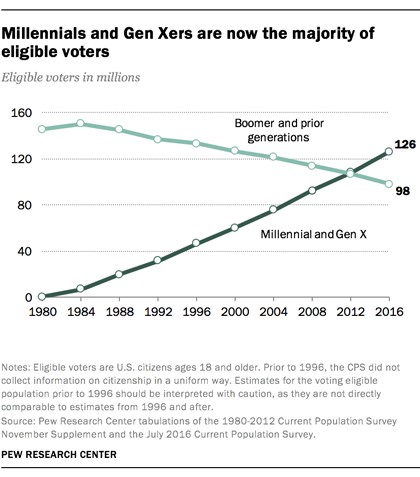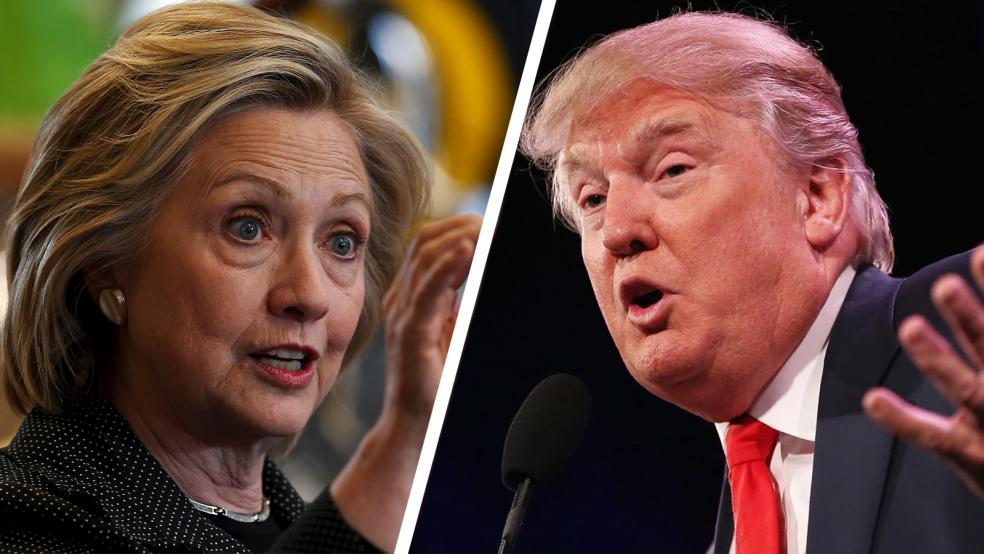It has been a political rule of thumb for decades that Baby Boomers and other older Americans rule the roost when it comes to presidential politics.
As the dominant share of the electorate, which faithfully turned out at the polls every four years, Boomers and the older “Silent Generation” enjoyed royal treatment from presidential candidates who were highly sensitive to their concerns about taxes, the size of government and the future of Social Security and other costly entitlement programs. Boomers and older Americans constituted 56 percent of the presidential vote in 2012, compared to 44 percent for the younger Millennials and Generation-Xers.
Related: The Odds of a Comfortable Retirement Are Worse Than You Think
But a new study by the Pew Research Center suggests that the Baby Boomers’ reign is coming to an end, and that the November election pitting Democrat Hillary Clinton against Republican Donald Trump likely will be the last time that Boomers and older voters dominate the political landscape.
The analysis by Richard Fry, a senior researcher on economics, documents the swelling ranks of Millennial and Generation X eligible voters, spanning in age from as young as 18 to as old as 50. This fast-growing cohort has gradually eclipsed the large group of older Americans who have begun to die off or are fading as a dominant political force.
Fry notes that the younger generations matched Baby Boomers and older Americans as a percentage of eligible voters in 2012 and are not likely to be outgunned in the November 8 presidential election.
“Historical patterns of voter turnout by generation also suggest the likely end of dominance by boomers and prior generations,” he wrote. “In general, as a generation ages, turnout rises, hits a peak, and then declines.”
Related: 78M Millennials Could Carry the 2016 Election. Here’s Why
The numbers are fairly convincing: As of July, roughly 126 million Millennials and Gen Xers were eligible to vote, making them 56 percent of all eligible voters, according to Fry’s analysis. That contrasts with just 98 million Boomers and other older Americans – or 44 percent of the population eligible to vote.

Although Fry cautions that a lot will depend on who actually turns out to vote on Election Day – and traditionally older voters tend to be more likely to turn out than younger voters – Millennials and Gen Xers will almost certainly put an end to the Baby Boomers’ dominance in the electorate.
Even if as many as 70 percent of Baby Boomers and older eligible voters turn out at the polls in November, Millennial and Gen Xers could still match them, even if they turned out at substantially lower rates. For instance, a 70 percent turnout among older voters would equal about 68 million votes. Yet Millennials and Gen Xers could match that number with a turnout rate of just 54.5 percent.
“In other words, the dominance [of Boomers] will be broken, but it’s premised on a big if” of precisely what percentage of older and younger voters actually turn out,” Fry said in an interview on Tuesday.
He added that older voters still might be more of a force in future off-year elections, when there is far less excitement about congressional and state campaigns. “But at least as far as presidential elections, it’s looking like the Boomers’ and older voters’ long reign may end this November,” he said.
Related: How the Democratic and GOP Platforms Clash Over Social Security Reform
The evolving generational shift in political clout in presidential campaigns could have important implications for future presidential races and policy-making in Washington.
Younger and older voters perceive the world and political parties differently, researchers say, with Silent Generation voters more conservative and inclined to support Republicans, while Millennials are more liberal in their views and inclined towards the Democrats.
Jocelyn Kiley, the associate director of research at the Pew center, said in an interview that this generational divide is fairly pronounced on a number of important public policy issues, including the size and role of the government, the future of Social Security, attitudes about same-sex marriage and other social issues.
“In the current political landscape, certainly there are difference in the political attitudes of younger generations and older generations,” she said. “That hasn’t always been the case, but we’ve seen for the last several years, for instance, a pretty large difference between the Silent Generation political preferences and the Millennial generations.”
Related: Social Security Trustees Project Trust Fund Will Be Tapped Out by 2034
Research has found, for example, that Millennials and other younger voters are more in favor of big government and expanded government services than older voters, and they tend to be far more optimistic about the economy and the future than older voters. About six in ten Millennials are opposed to cutting benefits in Social Security to address the system’s financial problems, according to a 2014 Pew survey, which was pretty much in line with the 70 percent of older Americans who opposed benefit cuts.
However, fully half of the Millennials interviewed said they didn’t believe there will be any money in the Social Security trust fund for them when they finally retire. Until now, advocacy groups for seniors and other liberal organization have staunchly opposed major reforms of Social Security, and instead have pressed for expanded benefits. As Millennials and Gen Xers grow in political importance, they may provide impetus for future presidents and members of Congress to consider entitlement reform to protect future beneficiaries.
And there is a much bigger generational gap on the question whether government in the future should give higher priority to programs that benefit younger Americans – including education, college debt retirement, job training and health care – than for older Americans. Fifty-three percent of Millennials surveyed by Pew in 2014 said the focus should be on younger people, compared to just 28 percent of the Boomers and older Americans who agreed with that premise.
“There’s an open question about to what degree these political attitudes persist as people get older,” Kiley said “But certainly right now we see that younger generations – both Gen-Xers and in particular Millennials – have more liberal views on a lot of issues.”





